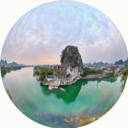0 Likes
Chapman Creek reaches the Georgia Strait at Davis Bay in Sechelt and is thought to have been one of the largest salmon producing streams on the Sunshine Coast prior to European contact in the mid-1800s. According to the Strategic Land Use Plan for the shishalh Nation (Draft 2007) this watershed has significant spiritual and cultural importance. It is also the source of drinking water for approximately 27,000 people. The will of the shishalh people and the Sunshine Coast Regional District for the management of this watershed is expressed in the Joint Watershed Management Agreement of 2005.
Since 1947, peak escapements for Coho, Pink and Steelhead have numbered in the hundreds. The peak number for Chum was 3500 spawners in 1973 and again in 1974. It is likely that the numbers for the Pink and Chum were much higher before the main creek mouth at the Wilson Creek estuary was diverted to its present outlet at Davis Bay in 1936.
Between 1967 and 1992, extensive logging and road building over unstable slopes caused over 300 landslides and road failures which impacted both drinking water quality and fisheries values. An Integrated Watershed Management Plan (IWMP) was completed in 1998 but was never implemented.
Chapman salmonids have also been negatively impacted by SCRD water withdrawals during late summer low flow periods. In 1999, a fish habitat and riparian assessment was conducted for the BC Ministry of Environment in conjunction with the Chapman Creek Watershed Restoration Project. A Coastal Watershed Assessment Procedure was completed by International Forest Products (Interfor) in 2000. It assessed the effects of past forest practices and provided recommendations for future forestry development. Also that year, Chapman Creek was one of only 15 streams designated as sensitive under the BC Fisheries Protection Act. Interfor abandoned this chart area in 2002.
Rainbow Trout and Dolly Varden were introduced before records were kept; Coho and Cutthroat were stocked in the late 1980s. Beginning in the early 1990s the Sunshine Coast Salmon Enhancement Society stocked Pink, Chum, Coho, Cutthroat, Steelhead and introduced Chinook. The stocking of Cutthroat was discontinued to ensure the survival of salmon fry and smolts. The Greater Georgia Basin Steelhead Recovery Action Plan of 2002 identified the stock status of both winter and summer Steelhead runs as a special concern. In 2004, during an enumeration of the Steelhead a total of only 2 adult Cutthroat were observed.
Chapman Creek is now regularly stocked with salmon fry. Returns have been disappointing and it is not clear that there are any wild self-sustaining salmon stocks left in this watershed.
(From the Sunshine Coast Conservation Association.)
...





The capital of Canada is Ottawa, in the province of Ontario. There are offically ten provinces and three territories in Canada, which is the second largest country in the world in terms of land area.While politically and legally an independant nation, the titular head of state for Canada is still Queen Elizabeth.On the east end of Canada, you have Montreal as the bastion of activity. Montreal is famous for two things, VICE magazine and the Montreal Jazz Festival. One is the bible of hipster life (disposable, of course) and the other is a world-famous event that draws more than two million people every summer. Quebec is a French speaking province that has almost seceded from Canada on several occasions, by the way..When you think of Canada, you think of . . . snow, right?But not on the West Coast. In Vancouver, it rains. And you'll find more of the population speaking Mandarin than French (but also Punjabi, Tagalog, Korean, Farsi, German, and much more).Like the other big cities in Canada, Vancouver is vividly multicultural and Vancouverites are very, very serious about their coffee.Your standard Vancouverite can be found attired head-to-toe in Lululemon gear, mainlining Cafe Artigiano Americanos (spot the irony for ten points).But here's a Vancouver secret only the coolest kids know: the best sandwiches in the city aren't found downtown. Actually, they're hidden in Edgemont Village at the foot of Grouse Mountain on the North Shore."It's actually worth coming to Canada for these sandwiches alone." -- Michelle Superle, VancouverText by Steve Smith.